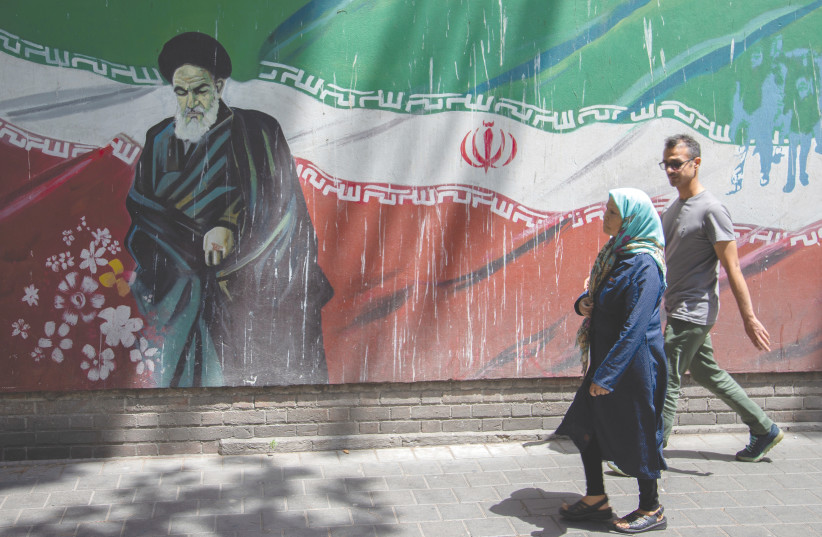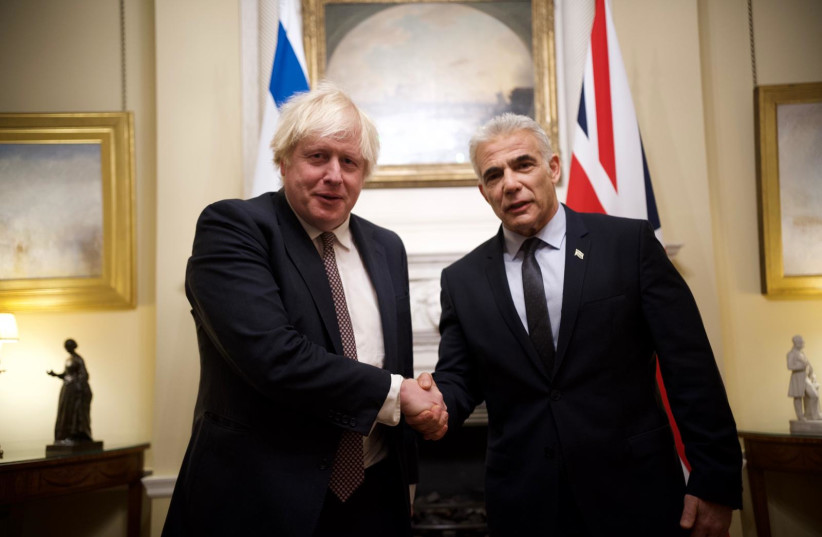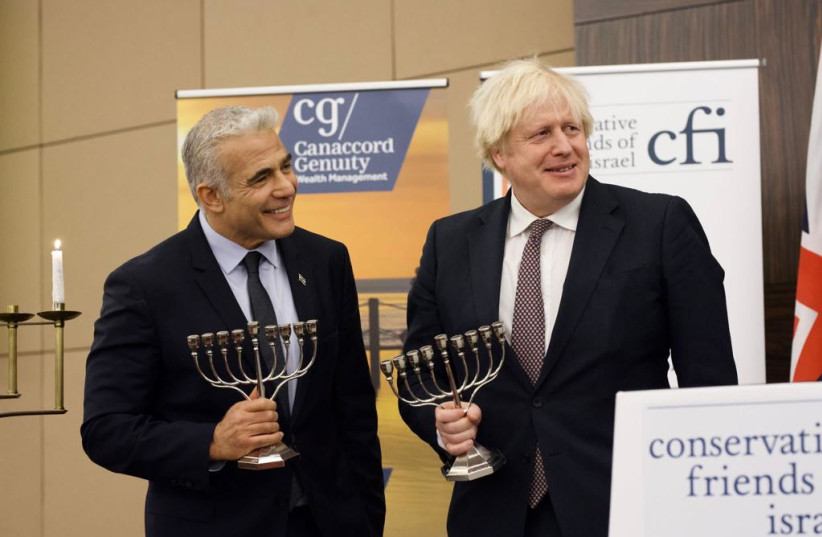Prime Minister Naftali Bennett sent a sharp message to the international community to be tough on Iran as nuclear negotiations resumed in Vienna on Monday.
Iran’s goal in the talks is for the US to lift sanctions while the Islamic Republic does almost nothing in return, the prime minister said.
“Iran won’t just keep its nuclear program: From today, they’ll be getting paid for it,” he warned.
World powers and Iran reconvened in Vienna on Monday after a nearly six-month break, to negotiate an Iranian and American return to the 2015 Joint Comprehensive Plan of Action nuclear deal (JCPOA).

The talks ended after about four hours with an agreement to start with a discussion of lifting sanctions on Tuesday “and then other issues,” as Iran’s lead negotiator and Deputy Foreign Minister Ali Bagheri Kani put it, avoiding explicitly mentioning negotiations to limit Iran’s nuclear program.
Iran agreed to build on the first six rounds of talks, which took place between April and June of this year, including a nuclear working group, despite Iranian officials’ statements ahead of the talks that the negotiations would not be about their nuclear program.
“There is a sense of urgency of putting the JCPOA back in place,” said EU negotiator and political director Enrique Mora.
“We have taken stock of the difficult circumstances of the JCPOA,” Mora stated. “Over the recent months, the Iranian nuclear program has advanced – and at the same time, the US is imposing the same sanctions.”
The negotiations took place in the Palais Coburg in Vienna, the same place where the JCPOA was signed in 2015. The American and Iranian teams were situated in separate rooms because the Islamic Republic’s representatives refused to negotiate directly with the Americans.
Israel opposes the JCPOA because it insufficiently limited Iran’s uranium enrichment – and in fact, legitimizes further enrichment after the agreement expires, which paves the way for an eventual nuclear bomb. In addition, the deal did not address Iran’s other malign actions in the region.
SKEPTICISM THAT Tehran would be willing to return to the 2015 agreement is widespread. As such, Washington is considering an interim agreement that some diplomats have called “less for less,” which would likely mean the US lifting some sanctions in exchange for Iran freezing – not rolling back – its nuclear program, which has advanced far beyond the JCPOA’s restrictions.

This is a significantly worse scenario as far as Israeli officials are concerned, because, as Bennett said, it would mean ““Iran won’t just keep its nuclear program... they’ll be getting paid for it.”
Israeli diplomatic sources have speculated that Iran only entered the talks in order to avoid a resolution against it at the International Atomic Energy Agency’s Board of Governors, which could lead to more sanctions.
In his remarks, Bennett pointed to Iranian authorities shooting protesters in Isfahan in recent days, as well as a remark by Iran Armed Force spokesman Brig.-Gen. Abolfazl Shekarchi earlier this week as characteristic of the regime’s intentions: “We will not back off from the annihilation of Israel, not even one millimeter.
“Such a murderous regime should not be rewarded,” Bennett said, calling on the world to make sure not to allow “hundreds of billions of dollars [to be] poured right into their rotten regime.
“Iran deserves no rewards, no bargain deals and no sanctions relief in return for their brutality. I call upon our allies around the world: Do not give in to Iran’s nuclear blackmail.”
Defense Minister Benny Gantz said Israel must be “strong and independent to present its own solutions to defend ourselves, by ourselves, when we decide we it must be done.”
Israel has been sharing intelligence with its allies about Iran’s continued race toward a nuclear weapon, Gantz said.
“I say to our partners: The time that passes must have a price in economic sanctions and military action so the Iranians will stop their nuclear race and regional aggression.”
Israel does not oppose talks and understands the need for a solution, but is against allowing Iran to fool the world, the defense minister said.
Gantz will be heading to Washington in the coming days to discuss regional security issues, namely Iran, with his counterparts.

IN A MONDAY meeting with UK Foreign Minister Liz Truss, Foreign Minister Yair Lapid said: “The Iranians are coming to these talks for only one reason – to get sanctions lifted. They need money for Hezbollah, for the Revolutionary Guards, for their global terrorist network and for their continued race toward a nuclear program.”
Lapid warned that the Iranians “will play for time” so they get a cash and investment influx from sanctions being lifted, while they covertly advance their nuclear program.
“This is what they have done in the past, and it is what they will do this time as well. The intelligence is clear. It leaves no doubt,” he said.
The way to stop Iran is through tighter sanctions and tighter supervision, and conducting negotiations from a position of strength, he added.
Lapid and Truss wrote in an article published in The Telegraph that their countries will “work night and day to prevent the Iranian regime from ever becoming a nuclear power.”
“The clock is ticking, which heightens the need for close cooperation with our partners and friends to thwart Tehran’s ambitions,” they wrote.
Iranian Foreign Ministry spokesman Saeed Khatibzadeh said in a press conference in Vienna that the op-ed “specifically, with a side [Israel] that has sought to destroy the JCPOA, indicates some European parties are not coming to Vienna with the necessary goodwill and want to lengthen the talks.”
Lapid also met with UK Prime Minister Boris Johnson at a Conservative Friends of Israel meeting, where he said the countries share a determination to stop Iran from obtaining a nuclear weapon “at all costs.”
“Israel will protect itself, but we know we are not alone,” he said.
JOHNSON SAID that “we will continue to do everything we can to prevent Iran from obtaining a nuclear weapon. As talks resume in Vienna, we hope diplomacy can work... but Iran’s overall behavior has to change.”
Lapid spoke of values Israel and the UK shared, and the UK’s role in fighting for democracy and freedom in World War II, contrasting that with Iran, whose president “sentenced thousands to death” and “hang[s] gay people from cranes.”
“Not all ideas are equally worthy of respect,” Lapid said. “And if someone tells us – as the Iranians, Hamas and Hezbollah do – that it is OK to kill my children because their distorted interpretation of Islam claims that it is ok to kill Jewish children, they must know – it is not going to happen.
“We are not going to get into a theological or ideological argument with them. We are going to defend ourselves from their evil and stand strong against their violence,” the foreign minister said, adding that the lessons of the Holocaust have not been forgotten.
Lapid is expected to meet with French President Emmanuel Macron on Tuesday to discuss Iran and bilateral relations.
Macron spoke with Iranian President Ebrahim Raisi about the nuclear talks on Monday evening, according to Iranian news agency IRNA.
Finance Minister Avigdor Liberman said it was “symbolic” that the nuclear talks are restarting on November 29, the date of the 1947 United Nations vote in favor of the partition plan that included the establishment of a Jewish state.
“It’s important to remember on this day that we established the Jewish state so we can defend every Jew,” he said in a Yisrael Beytenu faction meeting. “And even in this case, Israel is determined to do all that it can so Iran will not be a nuclear power.”
